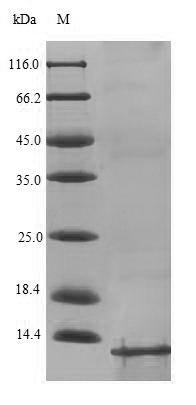S. aureus Prostatic Acid Phosphatase / ACPP Recombinant Protein Product Attributes
Product Type: Recombinant Protein
Recombinant Prostatic Acid Phosphatase / ACPP based upon sequence from S. aureus
Host: QP6412 protein expressed in E.coli, Yeast..
Tag: His
Protein Construction: A DNA sequence encoding the Staphylococcus aureus (strain Mu50 / ATCC 700699) Prostatic Acid Phosphatase / ACPP, was expressed in the hosts and tags indicated. Please select your host/tag option, above.
Recommended Applications: Immunogen, Protein Standard, Cell culture, or Other Cell Biology Applications.
Application Notes: Please contact us for application specific information for QP6412.
Bioactivity Data: Untested
Full Length? Full Length
Expression Region: Met1 – Lys77
Amino Acid Sequence: MENFDKVKDI IVDRLGVDAD KVTEDASFKD DLGADSLDIA ELVMELEDEF GTEIPDEEAE KINTVGDAVK FINSLEK
Purity: Greater than 90% as determined by SDS-PAGE.
Reconstitution Instructions: Concentrated protein in liquid format. Reconstitution is not necessary.
Concentration of S. aureus Prostatic Acid Phosphatase / ACPP Protein:
Endotoxin Levels: Not determined.
Buffer: Tris-based buffer, 50% glycerol
Storage Conditions: Store at -20C to -80C.
| Recombinant S. aureus Prostatic Acid Phosphatase / ACPP Protein General Information | |
|---|---|
| Alternate Names | |
| Prostatic Acid Phosphatase, ACPP, 5′-NT, Ppal, Lap, PAP, A030005E02Rik, FRAP | |
| Curated Database and Bioinformatic Data | |
| Gene Symbol | acpP |
| Entrez Gene ID | 31213993 |
| RefSeq Protein Accession(s) | WP_000426914.1 |
| RefSeq mRNA Accession(s) | NC_002758.2 |
| UniProt ID(s) | P0A001 |
| COSMIC ID Link(s) | acpP |
| KEGG Gene ID(s) | sav:SAV1232 |
| General Description of Recombinant S. aureus Prostatic Acid Phosphatase / ACPP Protein. | |
| Carrier of the growing fatty acid chain in fatty acid biosynthesis. Is able to confer high methicillin resistance to S.aureus when overproduced . | |
Limitations and Performance Guarantee
This is a life science research product (for Research Use Only). This product is guaranteed to work for a period of two years when stored at -70C or colder, and one year when aliquoted and stored at -20C.




There are no reviews yet.